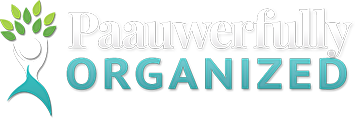Let’s face it … thinking about aging, mortality, and potential disasters are not things most people choose to focus on. That being said, we all know that life can change in a heartbeat. Although none of us have a crystal ball to perfectly plan for the future, there are things we can do to be prepared for various life situations. This preparation — or lack thereof — can significantly impact your life.
Tending to the suggestions provided in this blog — and sooner rather than later — can save you a lot of grief and heartache. If you have aging parents or other dependants, these tips will also help you to more effectively help others who rely on you.

The Boy Scouts have a motto that was created in 1908: Be Prepared.
“To be prepared means you are always in a state of readiness in mind and body to do your duty.” – Robert Baden-Powell, English soldier
This motto seems especially fitting for those of us who are part of the “sandwich generation.” My husband and I have an adult daughter and son-in-law…and on the other end of the spectrum is my 96-year-old father-in-law. Recently we spent some time thinking about all three generations – the kids, ourselves, and Dad – as we revised and updated a trust that we created back in 2010. Our financial planner and our estate planning attorney have helped us prepare for retirement, as well as for the eventual distribution of whatever we leave to individuals and causes we care deeply about.
As you review the tips below, I encourage you to begin implementing them soon. This will take some time to put in place, and it is well worth doing so you can be as prepared as possible for whatever comes your way.
Are you and your loved ones prepared for a disaster?
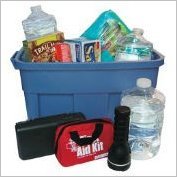
We don’t plan to fail…we fail to plan. Sooner or later, you or those you love may be affected by a natural disaster or emergency events such as a hurricane, snow storm, flood, fire, tornado, earthquake, or extended power outage. It’s much easier to stay safe and sound when you are prepared and you have a plan.
Ask those who live along the Carolina coast and they will tell you that life can change in a heartbeat. Since Tropical Storm Florence recently released its wrath and we still have over two months of hurricane season ahead of us, it serves as a good reminder to have a plan and necessary supplies in place. Last year just after Hurricane Harvey dealt its devastating blow on Houston, I published a free guide. I invite you to get your copy now and follow the advice: Your Guide to Preparing for Disaster.
If you are not in an area that experiences hurricanes, tornados, or floods, you may be in an earthquake zone, a region threatened by wildfires, or something else. No matter where you live, the Boy Scout motto — Be Prepared — will serve you and those you love.
Wills, Trusts and Retirement Planning
 Regardless of your age, every adult needs a Will. As you think about what to leave to your family, consider this: your kids and other family members may love you, but they may not love your stuff. The line can be very thin between bestowing and burdening loved ones with your worldly possessions. What do you keep, and what will you pass on when you die? Rather than guessing what your family members want to keep, ask them…and don’t lay on a guilt trip if they don’t want something you think they should have.
Regardless of your age, every adult needs a Will. As you think about what to leave to your family, consider this: your kids and other family members may love you, but they may not love your stuff. The line can be very thin between bestowing and burdening loved ones with your worldly possessions. What do you keep, and what will you pass on when you die? Rather than guessing what your family members want to keep, ask them…and don’t lay on a guilt trip if they don’t want something you think they should have.
A trust may also be beneficial for you to set up. A Revocable Living Trust can provide an easy way to keep control of your finances today. In case you become unable to manage your finances, the trust lets someone you’ve appointed take over to manage your finances on your behalf and according to your wishes. When you die, it will be easier to pass assets in the trust to your beneficiaries. Without a trust, your family will have to deal with probate, which in some states can be a lengthy and expensive process.
A trust spells out the rules that you want to be followed for property and assets held in trust for your beneficiaries. Common objectives for trusts are to reduce estate tax liability, protect property in your estate against personal lawsuits, create a legacy of charitable giving, provide financial security to an individual (usually a child or grandchild), and avoid probate.
Trust funds are not just created by the ultra-wealthy; it can be a powerful planning tool for average earners, too. For more information, read this article: Five Ways in which a Trust is Better than a Will
Retirement planning is the process of determining retirement income goals and the actions and decisions necessary to achieve those goals. Retirement planning includes identifying sources of income, estimating expenses, implementing a savings program and managing assets. Retirement planning can also assist with estate planning and what you intend to pass on to individuals or organizations you care about. For more information about this, read my blog about managing your finances.
Once your personal papers are in order and your will or trust is up-to-date, there’s one more thing to do. As helpful as all of these preparations will be, there are also matters of the heart. Write a letter to those you love — your spouse, children, other close relatives and friends — and express your love and appreciation. If an apology is in order, write a letter to right a wrong from your past, or forgive someone who has wronged you. Writing a “last letter” to show what’s in your heart will help you to depart this earth without regrets and will also help others to feel more complete with the relationship. Visit the Stanford Letter Project website if you need help with what to say.
Know Your Financial Responsibilities

According to Jane Bryant Quinn, almost everyone dies owing something to someone. Sometimes it’s just last month’s utility bills, but there can be shocking hidden surprises uncovered by surviving family members when debts surface that the spouse or surviving children knew nothing about. Examples include a large credit card debt, personal debt, or a home equity loan on a house that had previously been paid off.
What happens if there isn’t enough money in the estate to pay the debts? It depends on the type of debt. It’s important that you know what you are and are not responsible for. Your liability depends on several factors, including your state’s laws. I’ll list a few types of debt here:
- Unsecured creditors cannot collect money from life insurance payments to survivors, pay-on-death bank or brokerage account funds (these are easy to set up), a jointly-held property that passes directly to a surviving owner, or retirement plans with named beneficiaries. If no beneficiary was named, the funds become part of the estate, which is required to pay off creditors before the estate’s assets are distributed to surviving family members.
- If you were a co-signer on an application for a credit card or loan, you owe the balance, even if you did not know that there was a balance due. If you were only listed as an authorized user but did not co-sign the application, you may not be responsible for paying the balance, provided that you did not use the credit card after the death of the primary cardholder.
- Final medical bills are usually the spouse’s responsibility, especially if the spouse signed hospital admission papers that included a payment agreement. That being said, if the spouse has no money to pay these debts, some healthcare providers and medical institutions may write it off as uncollectible.
Don’t allow others to talk you into making payments on bills you are not responsible for. Creditors may try to convince you that you’re responsible when you’re not. Know your rights!
Difficult Conversations

One of the greatest challenges you will face as the child of an aging or incapacitated parent is figuring out how to sensitively handle your concerns about their physical or cognitive decline. This often represents a role reversal that feels like you are the parent instead of the child. Reversing this long-standing power structure can feel very uncomfortable.
This is especially difficult if your parent is having trouble accepting the fact that they have reached a point in life where they need assistance. Here’s an excellent article to help: Difficult Conversations: Helping a Parent Face Age-Related Declines.
My 96-year-old father-in-law gave up driving a couple years ago, but it wasn’t without a struggle. It was really hard for him to relinquish this part of his independence. Here are five questions to ask yourself or a loved one you are concerned about, to assess whether or not driving is safe:
- Do you have trouble reading street signs or street markings?
- Do you feel anxious or stressed while you are driving?
- Have friends or family members expressed concern about you driving? Have they reported feeling unsafe with you behind the wheel?
- Do you have physical limitations that make driving a challenge? For example, are you able to pivot your neck to the right and left to look to both sides? Can you see and hear well? If you have trouble seeing at night, do you limit your driving to daylight hours?
- Are you currently taking any medications that cause you to be drowsy? Is your judgment and reaction time adequate for safe driving in all weather conditions?
These can be tough questions to answer honestly. Just remember that your safety and the safety of everyone else on the road is at stake. If you aren’t sure you should still be driving, it’s probably time to give up the car keys and arrange for other safe modes of transportation.
Many older people don’t drive much and when they go somewhere it’s often within a few miles from their home. In these cases, it can actually save money to give up the costs of owning a car (gas, maintenance, insurance) and hire a cab, Uber or Lyft to travel short distances.
Another threat to watch for is scam artists. Elderly people are frequently preyed upon because they are so easy to take advantage of. Be especially mindful of the following scenarios:
- Situations where an unscrupulous family member, caregiver, or someone pretending to be romantically attracted gains trust and then takes advantage of their access to information and funds.
- Contractors who do work that does not need to be done, or who invoice for a much higher fee than the going rate for the project.
- Con artists who call on the phone with a convincing reason to share sensitive information (social security number, credit card number, passwords, etc.). The most popular scam right now is a call from the IRS demanding immediate payment for taxes due. Another popular scam is someone pretending to be a grandchild who got stranded in Europe after their passport and money was stolen, and they need money wired to them through Western Union so they can get back home.
I’ll take this opportunity to remind you of the importance of taking care of yourself, no matter how much support you’re providing to a loved one. It’s not selfish to care for yourself first — it’s responsible! If you are not getting enough rest, exercise, and eating a healthy diet, you will eventually put your own mental and physical health at risk.
Life-Saving Skills
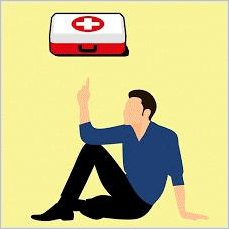
Life can change in a heartbeat, and you may be in a situation at some point in your life where these basic emergency skills could save someone else’s life:
Performing CPR is one of the easiest ways to save a life. By responding quickly when someone’s heart has stopped, you can double or triple a person’s chance of survival. The good news is that anybody can learn how to perform hands-only resuscitation. Click here to visit a website that teaches you in less than 3 minutes how to perform CPR.
Performing the Heimlich Maneuver is the recommended treatment for choking victims. Standing behind the person choking, deliver five blows to the middle of their back with the heel of your hand. If that does not dislodge the stuck object, wrap your arms around their chest and join your hands to make a fist between the bottom of their rib-cage and their navel. Perform five rapid abdominal thrusts, pulling back and upward on their body as if you were trying to lift them off the ground.
Create a Personal Operations Manual
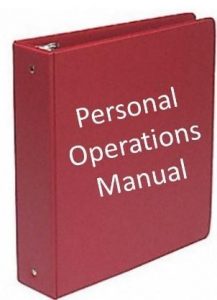 If you have ever suffered the loss of a parent or close relative, or if you’ve ever been suddenly thrust into a caregiving role because of an acute illness or accident, you know the emotional roller-coaster that accompanies such life events. You may also know the additional grief and havoc this can create when you are saddled with handling a loved one’s affairs when critical information is not documented, organized and easily accessible.
If you have ever suffered the loss of a parent or close relative, or if you’ve ever been suddenly thrust into a caregiving role because of an acute illness or accident, you know the emotional roller-coaster that accompanies such life events. You may also know the additional grief and havoc this can create when you are saddled with handling a loved one’s affairs when critical information is not documented, organized and easily accessible.
Regardless of age, we all need to be prepared for when the time comes that we die or become incapacitated. Nobody knows when that will be, so it’s best to be prepared now. Do you have your affairs in order?
Much of this preparation work can also be helpful if disaster strikes and destroys your home, including all of your important documentation. Imagine the angst you would experience if an earthquake, tornado, hurricane, fire or flood destroyed all of your records and basic identification! As people have fled their homes this past week in North Carolina and South Carolina, I hoped that some of them prepared ahead of time and were able to take important information with them.
Compiling a Personal Operations Manual (POM) will save you time and heartache if you ever need to quickly access important information or if you need to grab it and run. This also enables others you trust to step in and handle your affairs, if needed. Once you’ve created your POM, put a reminder on your calendar to do an annual update so it stays current. If you do this anually, it won’t take much time to do the updates.
There are three parts to the Personal Operations Manual:
- Directives and instructions (including your will or trust) that helps other trusted individuals to be clear about your wishes.
- Your financial/retirement plan.
- A master list of every account, financial asset, and obligation you have, as well as contact information for vendors and professionals you use.
Keep your POM in a safe and secure place — a paper copy in a fireproof box or safe deposit box and a password-protected electronic file stored on a portable flash drive – so it is only accessible to those who are supposed to see it, and so it cannot be easily destroyed if disaster strikes. Never leave this kind of sensitive information where the wrong people could get their hands on it.
Click here to access my blog that includes a list of all the information that needs to be gathered to include in your Personal Operations Manual.
Create a Plan NOW!
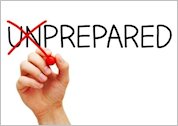
All the suggestions mentioned here will take some time and effort to create. Based on your specific needs and circumstances, create a priority list for yourself and carve out some time on your calendar to begin putting these things in place now. You’ll be glad you did when the time comes that you need it.
Here’s a recap of what may need your attention:
- Be prepared for a natural disaster or emergency event.
- Create or update your Will, Trust and Retirement Plan, regardless of your income level.
- Know what you’re financially responsible for when someone dies.
- Begin the difficult conversations that need to be had with loved ones experiencing a physical or cognitive decline. Remember to have a self-care plan in place as you provide care for others.
- Learn simple life-saving skills of CPR and the Heimlich Maneuver.
- Create a Personal Operations Manual so critical information is documented, organized and easily accessible if someone else needs to step in to help.
Additional Resources:
- Blog: Are You Prepared?
- Blog: Balance Your Life: Environment #7 – Financial
- Free Guide: Your Guide to Preparing for Disaster

Life Architect – Creating Blueprints for Purposeful & Productive Lives
Kathy@OrgCoach.net www.OrgCoach.net Follow me on Facebook

